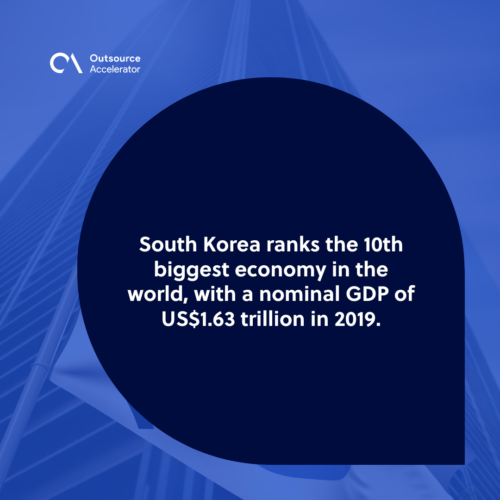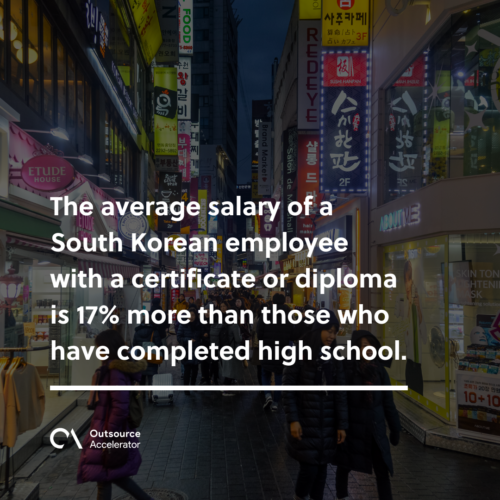An overview of the average salary in South Korea

South Korea is known to have had remarkable success in the rapid economic growth in Asia. The country’s economic powerhouse led them to be one of the innovation hubs in the world.
In fact, South Korea ranks as the 13th biggest economy in the world, with a nominal GDP of US$1.66 trillion in 2023. International Monetary Fund (IMF) projected to grow by 1.5% in GDP by 2025.
Businesses go to the country because of its attractive market. At the same time, its outsourcing services continue to rise significantly as Business Process Outsourcing (BPO) offers services in customer support, IT, and development.
In this article, find out the average salary in South Korea, its difference from other countries, and the factors that affect its rate.

The national average salary in South Korea
South Korea is known to have a highly skilled workforce, and its booming economy mostly derives from its technological edge.
In South Korea, the national average salary reflects the country’s wage policy and is typically measured in South Korean Won (KRW).
The average wage in the country range from 983,000 KRW (745 USD), which is the lowest average, to 17,400,000 KRW (13,181 USD), the highest average.
The average salary in South Korea can vary depending on the different job markets and job categories:
Wage policy
Currently, the average salary in South Korea for its employees is 3,890,000 KRW per month.
The minimum wage rate is set under the country’s Minimum Wage Act of 1986. It is amended each year on the 30th of November, determining the minimum wage of each industry category and the classification of workers.
According to the Korean Herald report, the minimum wage in South Korea was voted by the Minimum Wage Commission.
It has been set to 9,620 won (7.11 USD) for 2023 and 9,860 won (7.29 USD) for 2024.
Factors that affect the average salary in South Korea
The average monthly salary in South Korea is affected by several factors, such as the following:
Cost of living
It is inarguably that South Korea is one of the most expensive countries in the world. Mercer’s 2023 Cost of Living City Ranking revealed that Seoul ranks 16th place among cities that are expensive to live in.
It is typical for most countries to have more expensive rent rates in central business districts than in rural areas. Expats should allocate 30% to 40% of their monthly income to pay for their accommodation.
Below are the average prices for accommodation in South Korea.
| Accommodation (rent per month in Seoul) | |
| Average monthly living expenses for a family of four (excluding rent) | 2,700,000 KRW (2,300 USD) |
| Average monthly living expenses for a single expat (including rent) | 711,000 KRW (600 USD) |
| One bedroom apartment outside the city | 1, 000,000 KRW (746 USD) |
| Three bedroom apartment outside the city | 1, 600,000 KRW (1,195 USD) |
Educational background
The level of educational attainment is one of the biggest factors that determine the average salary of an employee.
The average salary in South Korea for employees with a certificate or diploma is 17% more than those who have completed high school.
Bachelor’s degree holders in South Korea typically earn 24% higher salaries. Their monthly salaries range between 3,500,000 KRW (2,586 USD) to 4,500,000 KRW (3,325 USD).
Employees with a master’s degree acquire between 5,500,000 KRW (4,064 USD) to 6,500,000 KRW (4,803 USD) monthly, 29% higher than the bachelor’s.
Finally, Ph.D. holders earn over 23% more than those with a master’s degree, earning 5,880,000 KRW (4,344 USD) monthly.

Industry
Large South Korean firms tend to give pay increases more than smaller companies. In the chart below, companies that belong to thriving and more profitable industries tend to have higher annual pay rises.
| Industry | Percentage of annual pay rise |
| Informational Technology | 9% |
| Construction | 9% |
| Banking | 6% |
| Healthcare | 6% |
| Education | 6% |
| Energy | 3% |
| Travel | 3% |
These figures listed above tend to change frequently depending on the current economic situation in South Korea and situations outside the country.
Salaryexplorer.com‘s latest Average salary complete guide lists the average salary in South Korea per month in major industries:
| Industry sector | Average Salary in South Korea (monthly) |
| Health and Medical | 5,800,000 KRW |
| Real Estate | 4,400,000 KRW |
| Banking | 4,230,000 KRW |
| Teaching/ Education | 4,120,000 KRW |
| Public Relations | 3,910,000 KRW |
| Human Resources | 3,680,000 KRW |
| Architecture | 3,610,000 KRW |
| Engineering | 3,280,000 KRW |
| Factory and Manufacturing | 2,650,000 KRW |
| Construction/ Building/ Installation | 2,290,000 KRW |
Roles and expertise
The average salary in South Korea may vary depending on the roles and expertise of an employee.
According to SalaryExplorer, surgeons or doctors rank as the highest-paying careers due to the critical nature of the profession.
Their salary ranges between 8,280,000 KRW (6,118 USD) to 26,400,000 KRW (19,507 USD).
SalaryExplorer also listed different salaries for the popular professions in South Korea.

| Job Title | Average Salary in South Korea |
| Accountant | 2,820,000 KRW |
| Financial Analyst | 5,260,000 KRW |
| Graphic Designer | 2,540,000 KRW |
| Photographer | 2,300,000 KRW |
| Flight Attendant | 2,760,000 KRW |
| Pilot | 6,690,000 KRW |
| Architect | 4,580,000 KRW |
| Business Analyst | 4,900,000 KRW |
| Project Manager | 4,560,000 KRW |
| Civil Engineer | 3,780,000 KRW |
| Call Center Representative | 1,530,000 KRW |
| Engineer | 3,770,000 KRW |
| Chief Executive Officer | 8,780,000 KRW |
| Chef | 2,510,000 KRW |
| Waiter / Waitress | 1,240,000 KRW |
| Dentist | 9,370,000 KRW |
| Nurse | 3,000,000 KRW |
| Human Resources Officer | 2,450,000 KRW |
| Developer / Programmer | 3,950,000 KRW |
| Attorney | 8,050,000 KRW |
| Cashier | 1,520,000 KRW |
| Sales Representative | 2,600,000 KRW |
| Secondary School Teacher | 3,090,000 KRW |
Location
Similar to other countries, the average salary in South Korea varies depending on where larger cities have higher wages than in the provinces.
Regions with fewer businesses and lower infrastructure have lower average salaries.
Here are some of the wages in major cities in South Korea:
| City | Average Salary in South Korea |
| Seoul | 52,319,400 KRW |
| Busan | 51,479,800 KRW |
| Incheon | 50,519,600 KRW |
| Daegu | 49,561,800 KRW |
| Daejeon | 48,721,100 KRW |
| Gwangju | 47,758,300 KRW |
| Suwon | 46,921,300 KRW |
| Ulsan | 46,080,100 KRW |
| Goyang | 45,119,800 KRW |
| Seongnam | 44,040,700 KRW |
| Bucheon | 43,198,900 KRW |
Gender
Male employees in South Korea are getting paid more than women. They earn 6% more than the female workers across all sectors.
South Korean male employee’s average salary starts at 4,000,000 KRW (2,955 USD), while female employees earn 3,780,000 KRW (2,793 USD).
Average salary in South Korea vs. Other countries
Given these figures, the average salary in South Korea is not much different from that in developed countries such as the USA and the UK.
The country’s fast-growing economy translates to a thriving employment rate that businesses can benefit from in many ways.
The following is the salary comparison of South Korea to other outsourcing countries and their markets.
| Outsourcing destination/market | Average salary |
| South Korea | US$2,082.97 |
| United Kingdom | US$2,416.00 |
| United States | US$3,534.00 |
| Philippines | US$308.00 |
| India | US$438 |
| South Africa | US$1,594.26 |
| Australia | US$3,333.00 |
| Germany | US$2,689.00 |
| Singapore | US$3,516 |
Outsourcing to South Korea
South Korea has a lot to offer for businesses and its workforce.
Thus, more service providers in the country continuously provide outsourcing services to local and global clients.
The average gross salary in South Korea varies depending on the industry but is generally competitive compared to other countries, especially in sectors like engineering, IT, and finance.
Here’s why you should consider outsourcing your business process in South Korea.
- Cost-effectiveness — relatively 2.5% cheaper than developed countries like the USA in terms of cost of living, wages, tax, and others.
- Technological edge and infrastructure — the most innovative country worldwide, according to Bloomberg’s Innovative Index 2021.
- Rapid growth economy — ranks 10th largest economy in the world.
- Strong ties with global investors — signed free trade agreements with Central American countries.
- Highly skilled workforce — South Korea spends almost 7% of its GDP on education.
All these advantages highlight the potential opportunities for the outsourcing industry in South Korea. Plus, their average monthly salary is worth noting.
That said, it is worth considering for businesses to look for outsourced services in the country.







 Independent
Independent




